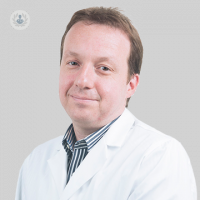pharmacotherapy for smoking cessation
Written by:Smoking is a chronic addictive disease. It constitutes the first avoidable cause of death in the world. Healthcare professionals are required to treat smokers correctly to ensure they are no longer smoking.
Smoking is the most pernicious addiction in the developed world and is the first preventable cause of death in Spain. According to recent data, every year 55,000 people die in our country because of tobacco. The WHO says that tobacco kills more than 4 million people a year, and is estimated to exceed 8 million deaths by 2020.
According to the National Health Survey (ENS) 2015, 26% of Spanish adults smoke, which is equivalent to about 12 million people. As for gender, consumption in men is reduced, while there is an increase in smoking among the female population, from 23% of smokers to 27.2%.

What is the treatment for smoking cessation?
The treatment against smoking is different for each smoker and depends on the motivation they have to quit smoking. Those who are willing to quit should receive two types of intervention: one aimed at combating psychic dependence and another to relieve physical dependence on nicotine, which is the substance responsible for the physiological addiction and withdrawal symptoms. This addiction is comparable to that produced by cocaine or heroin.
Smoking Cessation Medications
In the last decade new drugs have appeared to help quit smoking. The breakthrough in the therapeutic field of pharmacological treatments has opened a debate on the necessity of its financing by the public sanitary system.
The publication of recent scientific evidence on varenicline, one of the most used drugs in smoking cessation, concludes that it triples the chances of success against not using any drug.
Perks of stop smoking
The benefits of quitting are multiple. The exfumador rapidly experiences a substantial improvement in his quality of life, with a significant increase in his tolerance to exercise and his gustatory and olfactory capacities. The risk of strokes per year decreases, the risk of a heart attack decreases by half, and the likelihood of respiratory disease, including lung cancer, decreases. In addition, smokers who quit have up to one-half reduction in work hours, fewer days lost due to illness, and fewer doctor visits.
Who can offer me treatment to stop smoking?
In Spain have begun to develop autonomic plans for tobacco control. In this consultation will be applied the latest diagnostic and therapeutic advances to quit smoking. The participation of the physician specialized in Pneumology in the smoking cessation considerably increases the rate of abandonment of smoking patients within the units of smoking cessation.


